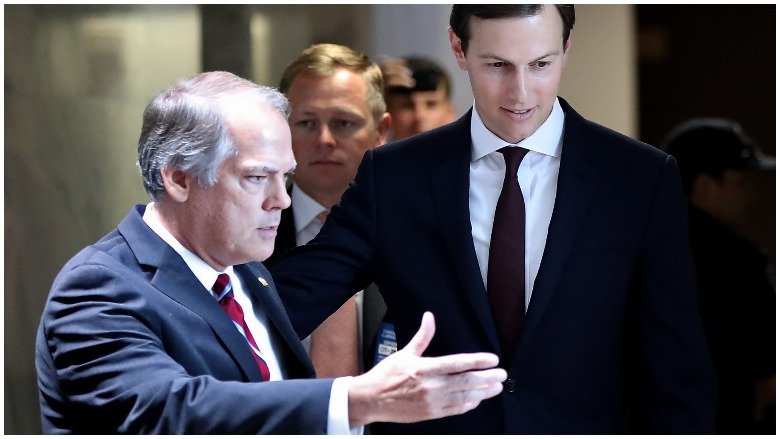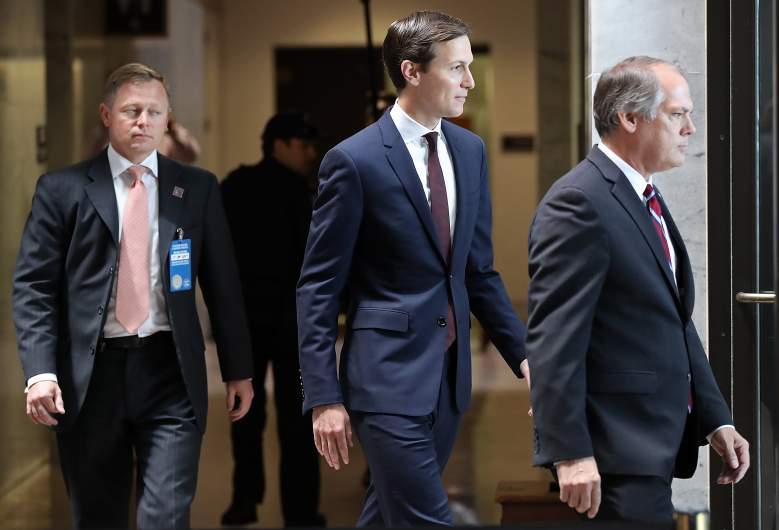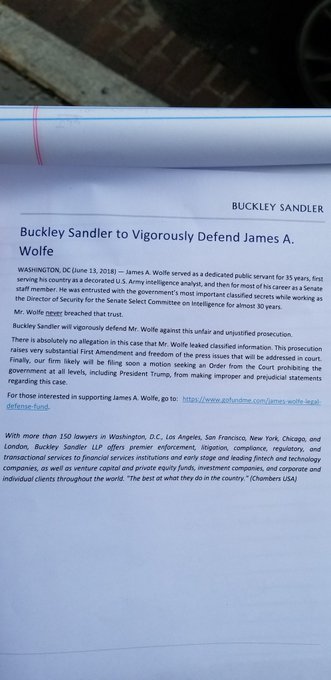
Getty Jim Wolfe (left) with Jared Kushner
James A. Wolfe, a former staff employee of the Senate Select Committee on Intelligence (SSCI), is accused of making false statements to special agents of the FBI “during the course of an investigation into the unlawful disclosure of classified information” to reporters, federal prosecutors announced.
You can read the court documents later in this article. James A. Wolfe, 58, is from Ellicott City, Md. According to a press release from the U.S. Department of Justice, Wolfe was indicted by a federal grand jury on three counts of violating Title 18, United States Code, Section 1001.
“Wolfe is alleged to have lied to FBI agents in December 2017 about his repeated contacts with three reporters, including through his use of encrypted messaging applications,” the release says. “Wolfe is further alleged to have made false statements to the FBI about providing two reporters with non-public information related to the matters occurring before the SSCI.”
His attorney has now responded on his behalf, saying Wolfe will seek to stop President Donald Trump and others from “making improper and prejudicial statements about the case,” saying that Wolfe never leaked classified information or breached the public trust. Wolfe has pleaded not guilty to the charges.
The New York Times revealed that one of the reporters, Ali Watkins, now works for the newspaper and that investigators had “seized years’ worth of (the) New York Times reporter’s phone and email records.” According to the Times, “F.B.I. agents approached Ms. Watkins about a previous three-year romantic relationship she had with Mr. Wolfe, saying they were investigating unauthorized leaks.” Ben Smith, editor in chief at Buzzfeed, where Watkins previously worked, joined the Times in raising concern about the government’s investigatory tactic, saying in a tweet, “This story concerns a reporter’s work @BuzzFeedNews. We’re deeply troubled by what looks like a case of law enforcement interfering with a reporter’s constitutional right to gather information about her own government.”
According to The Times, “It appeared that the F.B.I. was investigating how Ms. Watkins learned that Russian spies in 2013 had tried to recruit Carter Page, a former Trump foreign policy adviser.” Here is that article, which ran in Buzzfeed. It starts, “A former campaign adviser for Donald Trump met with and passed documents to a Russian intelligence operative in New York City in 2013.”
Here’s what you need to know:
1. Wolfe Was Director of Security for the SSCI, Where He Worked for Three Decades
Wolfe was a long-time veteran of the SSCI, the government’s release says. “At the time he made the alleged false statements to the FBI, Wolfe was Director of Security for the SSCI, a position he held for approximately 29 years,” the indictment claims.
The Justice Department alleges that, as SSCI Director of Security, Wolfe “was entrusted with access to classified SECRET and TOP SECRET information provided by the Executive Branch, including the U.S. Intelligence Community, to the SSCI. In this position, Wolfe was responsible for safeguarding all classified information in the possession of the SSCI.”

James Wolfe
“The Attorney General has stated that investigations and prosecutions of unauthorized disclosure of controlled information are a priority of the Department of Justice. The allegations in this indictment are doubly troubling as the false statements concern the unauthorized disclosure of sensitive and confidential information,” announced Assistant Attorney General for National Security John C. Demers. “Those entrusted with sensitive information must discharge their duties with honesty and integrity, and that includes telling the truth to law enforcement.”
According to the release, “The maximum penalty for each count of making a false statement to federal law enforcement agents is five years in prison. The maximum statutory sentences are prescribed by Congress and are provided here for informational purposes. The sentencing of the defendant, if he is later convicted, will be determined by the court after considering the advisory Sentencing Guidelines and other statutory factors.” He is not charged with disclosing classified information.
A GoFundMe page establishing a legal defense fund for James Wolfe says, “Jim is battling the full weight of the Trump Administration’s Department of Justice in this unwarranted and unfair prosecution. He has been swept up in the frenzy surrounding information leaks in today’s charged DC atmosphere, but he has not been charged with leaking or mishandling classified information. He has been singled out among Congressional and Executive branch officials for contacts with reporters. His case raises very real First Amendment and Freedom of the Press issues. Jim is fighting alone.”
2. The New York Times Says Its Reporter’s Electronic Data Was Seized

Ali Watkins
News organizations have raised concern about the government’s tactics during the Wolfe investigation. According to the story in The New York Times, Wolfe’s case “led to the first known instance of the Justice Department going after a reporter’s data under President Trump.”
The Times reported that the seizure was “disclosed in a letter to the reporter, Ali Watkins” and “suggested that prosecutors under the Trump administration will continue the aggressive tactics employed under President Barack Obama.” (According to The San Diego Union-Tribune, “President Barack Obama, in fact, set a record for any president with his number of prosecutions against leakers using the Espionage Act.” The article includes a list.)
The Times continued, “F.B.I. agents approached Ms. Watkins about a previous three-year romantic relationship she had with Mr. Wolfe, saying they were investigating unauthorized leaks.”
Eileen Murphy, a Times spokeswoman, expressed concern, saying, “Freedom of the press is a cornerstone of democracy, and communications between journalists and their sources demand protection.”
The Times reports that investigators did not seize the contents of messages but had “years of customer records and subscriber information from telecommunications companies, including Google and Verizon, for two email accounts and a phone number of hers.”
According to the newspaper, Watkins asserts that Wolfe “was not a source of classified information for Ms. Watkins during their relationship,” and she previously worked for Buzzfeed and Politico. The Times reported that she disclosed the relationship to the three news organizations (Times, Buzzfeed, and Politico). “The reporter told the Times she did not use Wolfe as a source during their three-year relationship, which spanned her work at BuzzFeed News and Politico,” New York Daily News reports. The Washington Post reports, though, that McClatchy’s vice president, where she also worked, said, “We were not aware of these allegations that Mr. Wolfe had a relationship with Ali Watkins until the news of the indictment broke,” adding that the organization doesn’t know whether Wolfe was ever her source. She told Politico a month after working there, The Post reported.
Watkins covered top national security stories, including one for Buzzfeed in 2017 on Michael Flynn that starts, “The FBI was investigating former Trump national security adviser Michael Flynn as recently as December, a high-level US intelligence official has told BuzzFeed News.” You can see more of her stories for Buzzfeed here.
Watkins’ journalistic star started rising in college. In March 2014, Philly.com reported of her, “A senior in Temple University’s journalism program helped break a recent national story that has members of the U.S. Senate pointing fingers at the CIA…The story she developed with two other bylined reporters ran March 4 and chronicled how the CIA Inspector General’s Office asked the Justice Department to investigate allegations stemming from an as-yet-unreleased Senate Intelligence Committee report. The report delves into the CIA’s secret detention and interrogation program, the team of reporters said in a story that was widely circulated.”
The Times is now conducting a review.
The reporter was described as a 22-year-old freelancer who “received a tip from sources who came to trust her while making herself a presence on Capitol Hill.” Her LinkedIn page says she also worked for the Huffington Post and McClatchy. Her top pinned tweet on Twitter read, “Have a story about ATF, DEA or Secret Service? Talk to me securely. Signal/WhatsApp” and provided a number. Her profile reads, “National security at @nytimes. I like my dog and motorcycles and Philadelphia. Send secrets and/or whiskey” and included her New York Times email.
Watkins’ lawyer, Mark J. MacDougall told CNN: “It’s always disconcerting when a journalist’s telephone records are obtained by the Justice Department — through a grand jury subpoena or other legal process. Whether it was really necessary here will depend on the nature of the investigation and the scope of any charges.”
In December 2017, Watkins wrote on Twitter, “After four and a half years, today is my last day covering the Senate Intelligence Committee. I am here to report that I never actually did secure a chair.”
She posted a series of other tweets about it. “Covering Senate Intel, though, has been crazy and frustrating and a hell of a lot of fun. I learned a lot. And since there’s heightened interest in this otherwise quiet Hill fixture, here’s some random stuff I learned.”
Other tweets include:
“The concept of ‘who watches the watchmen’ is so important. SSCI is *the* external oversight check on some of the administration’s most secretive programs. Someone (ie, journalists) needs to make sure they’re doing it well. It’s easy to write the ‘SSCI is too secret! Closed-door oversight is ironic!’ story. Agreed, great. Good to recognize & challenge it. Also important to get over it and figure out how to work around it. Being outraged will exhaust you and distract you from actually covering it.”
“Respecting and understanding the system has made me better at covering it. By and large, I’ve found SSCI staff to be wicked smart, experienced people who don’t want to lose their clearances. When you make an effort to understand that, it makes you a better reporter (and human).”
“The partisanship of the committee goes in waves. It’s good to keep track of that, communicate it and hold them to account about it. Politics and intelligence have historically not mixed well. Neither has its oversight. On that note, be cognizant when you’re reading stuff you suspect is leaking from the Hill, regardless of committee. Be able to separate politics from the facts. The number of people fully read into some of this sensitive stuff is infinitesimally small. Even *MORE* important, I’ve learned to spot the difference between political reporting about intelligence stuff, and intelligence reporting. They’re both super important. They’re also different. This is especially important on the Russia story. SSCI is a repository for almost every secret program and covert action you can imagine (and those you can’t). Russia is far from their only responsibility. They have to oversee more than 17 (17!) IC components. There’s way more to SSCI than Russia. That should be covered, too.”
She added, “The CIA once told me I have ‘an emotional dependence’ on covering SSCI. I thought they were wrong until I have to leave (they were a *little* right.) I’ve loved getting to know this weird hallway. Thanks to everyone who followed and put up with my angsty tweets about chairs.”
Complicating matters even more, CNN is reporting that US Customs and Border Protection officials are investigating agent Jeffrey Rambo for allegedly approaching Watkins and inquiring about her sources.
3. Wolfe Was Accused of Using WhatsApp & Other Programs to Engage in ‘Extensive Contact With Multiple Reporters’

Wolfe is on the far left
According to court documents, “On or about October 30, 2017, FBI agents met with Wolfe and informed him that they were investigating the unauthorized disclosure of classified information that had been provided to the SSCI by the Executive Branch of the United States for official purposes.”
During the interview, FBI agents “showed WOLFE a copy of a news article authored by three reporters, including REPORTER #1, about an individual (referred to herein as “MALE-l), that contained classified information that had been provided to the SSCI by the Executive Branch for official purposes,” the court documents say. Asked if he had contact with any of them, he answered no, according to the indictment.
The indictment says he also said no when asked “if he had traveled internationally with any reporter, gone to a baseball game or to the movies with a reporter, or had weekly or regular electronic communication with a reporter.” The reporters are not named in the document.
The indictment further alleges:
The FBI agents asked WOLFE about an article written by REPORTER #2 that contained information that had been provided to the SSCI by the Executive Branch for official purposes. WOLFE denied knowing about the reporter’s sources for the article. After WOLFE stated that he did not know about REPORTER #2’s sources, FBI agents confronted WOLFE with pictures showing WOLFE together with REPORTER #2. After being confronted, WOLFE admitted to the FBI agents that he had lied to them, and that he had engaged in a personal relationship with REPORTER #2 since 2014, but maintained that he (WOLFE) had never disclosed to REPORTER #2 classified information or information that he learned as Director of Security for the SSCI that was not otherwise publicly available. WOLFE also stated that he never provided REPORTER #2 with news leads, intelligence, or information about non-public SSCI matters.
According to the indictment, “Despite WOLFE’s statements, WOLFE had, in truth, engaged in extensive contact with multiple reporters, including conveying to at least two reporters information about MALE-1. WOLFE used his personal ce1l phone, his SSCI-issued electronic mail account and anonymizing messaging applications, including Signal and WhatsApp, to exchange electronic communications with reporters.”
Wolfe is further accused of having “regularly met clandestinely in person, and communicated, with REPORTER #2, with REPORTER #3, and with other reporters, in places where the substance of their communications was unlikely to be detected by others, including secluded areas of the Hart Senate Office Building, restaurants and bars, and private residences.”
The indictment provides extensive detail about Wolfe and reporter 2, without naming that person. It alleges:
During in or around 2013 and in or around 2014, REPORTER #2 was an undergraduate student serving as an intern with a news service in Washington, D.C. In approximately December 2013, WOLFE and REPORTER #2 began a personal relationship that continued until in or around December 2017. From in or around mid-2014 through in or around December 2017, REPORTER #2 was employed in Washington, D.C. by several different news organizations covering national security matters, including matters relating to the SSCI. During this period, REPORTER #2 published dozens of news articles about SSCI and its activities. From in or around mid-2014 through in or around December 2017, WOLFE and REPORTER #2 exchanged tens of thousands of electronic communications, often including daily texts and phone calls, and they frequently met in person at a variety of locations including Hart Senate Office Building stairwells, restaurants, and REPORTER #2’s apartment. WOLFE and REPORTER #2 also communicated with each other through encrypted ceIl phone applications.
Wolfe is accused of telling “Reporter #2” that “I’ve watched your career take off even before you ever had a career in journalism… I always tried to give you as much information that I could and to do the right thing with it so you could get that scoop before anyone else… I always enjoyed the way that you would pursue a story, like nobody else was doing in my hallway. I felt like I was part of your excitement and was always very supportive of your career and the tenacity that you exhibited to chase down a good story.”
4. Wolfe Was an Intelligence Analyst for the U.S. Army Who Married an FBI Agent
Wolfe’s second wife was Jane Rhodes-Wolfe, The New York Times reported. She was a top official in the FBI. According to a biography of Jane Rhodes-Wolfe on the website of Western Michigan University, she “started her career as a special agent for the Federal Bureau of Investigation in the New York field office, investigating financial fraud and terrorism violations. From 2004 until 2011, Rhodes Wolfe held leadership roles in Chicago, Washington, D.C., and Philadelphia. She served as supervisory special agent of a Joint Terrorism Task Force, assistant inspector and assistant special agent in charge.”
The biography continues that, “In 2012, Rhodes Wolfe became a member of the Senior Executive Service in the FBI’s Counterterrorism Division. She led national programs dedicated to the disruption and prosecution of terrorists. During this assignment she specialized in the identification of threat financing networks and worked to proactively collaborate with the financial industry to defeat corrupt financial networks. In 2014, she assumed responsibility for the Exploitation Threat Section where she was responsible for threat reporting and mitigation, terrorism communication analysis and crisis management.”
Rhodes Wolfe “retired from the FBI in March 2016 and is now a consultant, providing her expertise in enterprise risk management issues, business development, security, crisis planning, and employee misconduct and litigation support to private sector and government clients,” says the bio.
A speaker’s bio for her says, “In October 2003, she became a Supervisory Special Agent (SSA) at FBIHQ in the Office of Congressional Affairs. She was responsible for liaison with key Congressional members and staff of the Senate and House Appropriations and Intelligence Committee.”
James Wolfe’s LinkedIn page says that before the SSCI, he worked as an Intelligence Analyst for the U.S. Army from 1983-1987. He doesn’t list any other employment. He was based at Fort Meade. The GoFundMe page says, “He has served this Country honorably and is a decorated U.S. Army Veteran and served 31 years with the U.S. Senate Select Committee on Intelligence, including more than 29 years as the highly respected Director of Security for the Committee.”
His page also says that he attended the University of Maryland College Park, earning a degree in Business Administration and Management. He also goes by the name Jim Wolfe.
“Wolfe worked under leadership of both parties since 1987, before he abruptly departed the panel at the end of 2017,” CNN reported.
The day before the indictment, CNN reported, “Wolfe denied being contacted by the DOJ or FBI” to a CNN reporter. Wolfe recently retired from his job.
5. Wolfe Was Accused in a Domestic Violence Case Involving His Former Wife & Senate Leaders Stressed They Take the Matter ‘Extremely Seriously’

GettyU.S. President Donald Trump’s son-in-law and senior White House advisor, Jared Kushner, (C) departs following a meeting with the Senate Select Committee on Intelligence July 24, 2017 in Washington, DC.
Maryland court records obtained by Heavy show that Wolfe was accused of domestic violence years ago. The cases involve his ex-wife, Leslie Adair Wolfe. The couple’s marriage license says that they were married in 1984 when Wolfe was 24 and working at Fort Meade. His wife was 28. James Anthony Wolfe’s place of birth was listed as Kentucky on the marriage license.
The criminal case was filed in 2004, according to Maryland court records, which list it as “assault – sec degree,” a misdemeanor. The complainant was listed as Leslie Adair Wolfe. A “hearing – domestic violence” was held that year. Leslie filed for divorce in 2003, the court records show. There is also a 2003 domestic violence case listed in the court records in which a protective order was issued. In addition, a civil suit was filed against Wolfe by Tower Federal Credit Union, listing the Senate office building as his address, the court records show.
A spokesperson for the Senate Intelligence panel confirmed to The Daily Caller that Wolfe was charged in the case but said the charges “referenced were dropped in 2004.”
“Security clearances are reviewed approximately every five years. Mr. Wolfe’s clearance was reissued in August 2008. We cannot speak for the committee’s leadership at the time, but they likely would have been aware and the incident would have been looked at as part of the subsequent review by the FBI,” the spokesperson told Daily Caller.
In 2014, Wolfe was among “the current and past Democratic staff of the Senate Select Committee on Intelligence” thanked “for their hard work and diligence on the Committee Study of the Central Intelligence Agency’s Detention and Interrogation Program.”
There are two C-Span videos in that organization’s library that reference him.
Senate Intelligence Committee Chairman Richard Burr and the committee’s top Democrat, Sen. Mark Warner, said in a joint statement: “While the charges do not appear to include anything related to the mishandling of classified information, the committee takes this matter extremely seriously. We were made aware of the investigation late last year, and have fully cooperated with the Federal Bureau of Investigation and the Department of Justice since then.”
